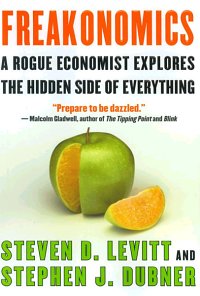“Freakonomics – A Rogue Economist Explores The Hidden Side Of Everything” – By Steven Levitt and Stephen Dubner
 This is a book that will challenge your notion of “conventional wisdom.” Steven Levitt brings up many intriguing questions and arrives at incredible conclusions supported by his research.
This is a book that will challenge your notion of “conventional wisdom.” Steven Levitt brings up many intriguing questions and arrives at incredible conclusions supported by his research.
Which is more dangerous: a gun or a swimming pool? If drug dealers make so much money, why do they still live with their mothers? What really caused a drop in crime-rate in the 90s: more policing, prosperous economy, or something completely unexpected? What do Sumo wrestlers and schoolteachers have in common?
Statistics show that the chances of a kid getting killed in a gun-related accident are extremely low compared to drowning in backyard swimming pools. Yet, we would hesitate to send our kids to a friend’s home if his parents own a gun; but we hardly give it a second thought if there was a swimming pool in their backyard.
How much money do the drug dealers make? Where does all the money go? Using some first hand experiences, the authors give us an inside view of how this business works.
How much do parents matter in bringing up kids? Based on economic data, it appears that “who the parents are” matters more than “what they do.” Which of the things that we do for our kids really help and which are just “obsessive parenting”? Does a home full of books help kids become successful? How about frequent visits to the museum? Or a good neighborhood? Or time spent watching TV? Levitt’s analysis and conclusions will surprise you.
Does a real estate agent sell your house in exactly the same way she would sell hers? Selling your house for the highest possible price should be a “win-win” for both of you, right?
How much do the names we give our kids matter? How do the names become more or less popular? Does that change with time? What other factors come into play?
These are some of the many questions addressed in the book. The conclusions presented based on scientific studies will surprise you.
I listened to the audio version of this book, and liked it as much as I liked “Predictably Irrational.”





























[…] Book Review: “Freakonomics” – By Steven Levitt and Stephen Dubner […]
[…] after listening to two other eye-opening books on Behavioral Economics: Predictably Irrational and Freakonomics. In fact, I had learned about this upcoming book from Dan Ariely, the author of Predictably […]
[…] experiments very similar to this in books on behavioral economics such as Predictably Irrational, Freakonomics and […]
[…] field of behavioral economics. I have looked for other books or articles on the subject, and found Freakonomics, Sway, and The Tipping Point, to name a few. Why did I find these interesting? It is because they […]